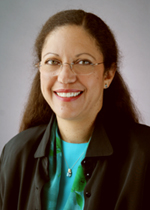|
Back
| Biography |
|
|
 |
|
As a faculty member at UCSD, Dr. Shelia Broyles has made substantial
contributions to several research projects in the Division of Community Pediatrics
for over 15 years. Dr. Broyles earned her PhD in Psychology form UCSD and an
MPH with a concentration in Epidemiology from SDSU. Her experience includes,
but is not limited to: the oversight and conduct of two longitudinal studies of
cardiovascular disease risk factors in Anglo- and Mexican-American families;
and, the design and conduct her own NHLBI-funded observational study of CVD risk
factors in African-American families. She also serves a critical role in the
organization and coordination of many projects within the division of Community
Pediatrics, and with community partners and other academic institutions. She is
the Administrative Core Director for the San Diego EXPORT Center and the Program
Director for the UCSD School of Medicine, Hispanic Center of Excellence.
Dr. Broyles' National Institutes of Health (NIH), National
Center on Minority Health & Health Disparities (NCMHD), Comprehensive Research
Center in Health Disparities (CRCHD) funded pilot project is described below. |
Q and A with Dr. Shelia Broyles [ 250 kb PDF ]
See Also: Selected Publications
Pilot Research
Dr. Broyles' Pilot Research Study examined the feasibility of Healthy Start Curriculum
within Neighborhood House Association - Head Start programs. Project Head Start is a
federally-funded child development program designed to help break the cycle of
poverty by providing preschool children of low-income families with a comprehensive
program to meet their emotional, social, health, nutritional and psychological needs.
The majority of Head Start students in San Diego are Latino and almost all of the
students are people of color. Healthy Start is a tested culturally-competent 12 unit
health curricula with goals to increase preschoolers' health, safety, and nutrition
awareness and to provide opportunities to practice healthy behaviors through a
variety of activities. The specific aims of the study were to determine if:
- Head Start teachers can successfully integrate a physical, emotional, and
social health curricula in their classrooms.
- Classroom, teacher and parental factors contribute to the adoption of this
enhanced health curriculum.
- There are barriers related to teacher training and parent involvement that
prevent a child from benefitting from enhanced health curriculum.
- There is preliminary evidence that this curriculum will contribute to
improved health awareness of preschoolers and their parents.
Through this study, Dr. Broyles determined that the Healthy Start Curriculum can be
incorporated with the Head Start Centers if the curriculum is taught over the whole
year and not just the original time frame of 12 consecutive weeks. The follow-up
study conducted during the second year of the Feasibility Study demonstrated that
although teachers liked the Healthy Start curriculum and tried to continue to teach
it, they typically did not have enough time to teach it; due primarily to competing
requirements. Efforts are currently underway to better integrate the program into
the typical lesson plans.
[ Top ]
|
